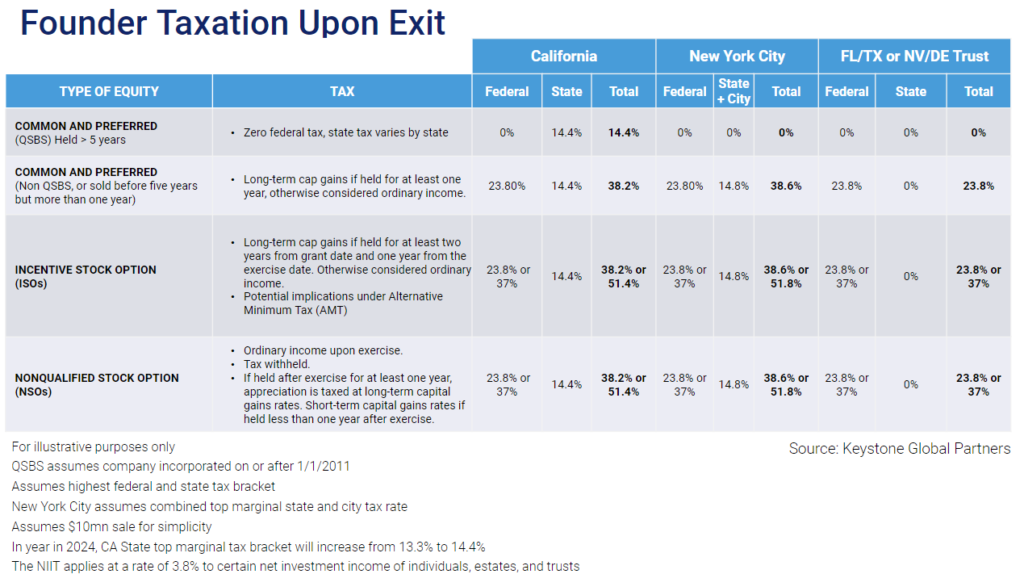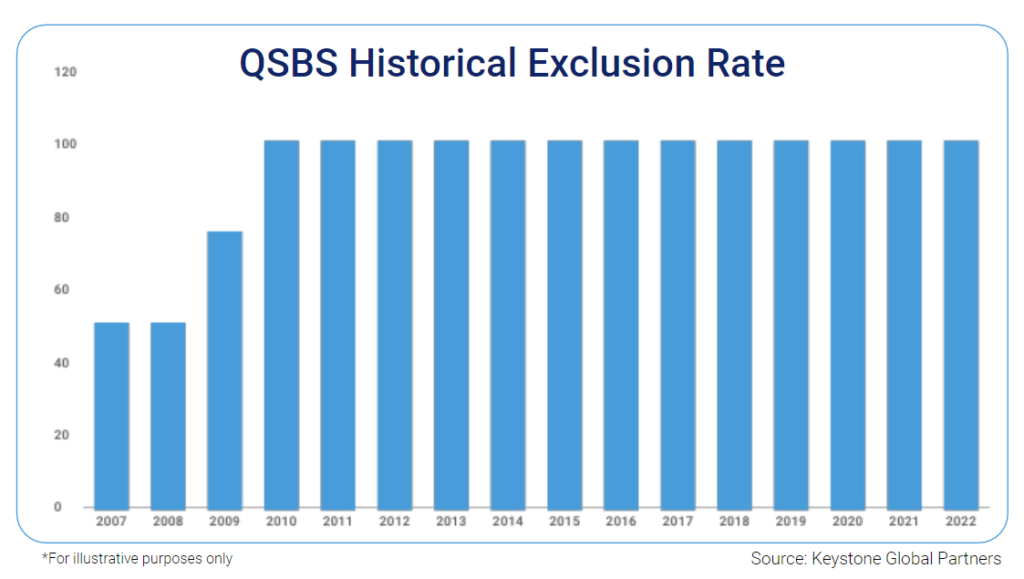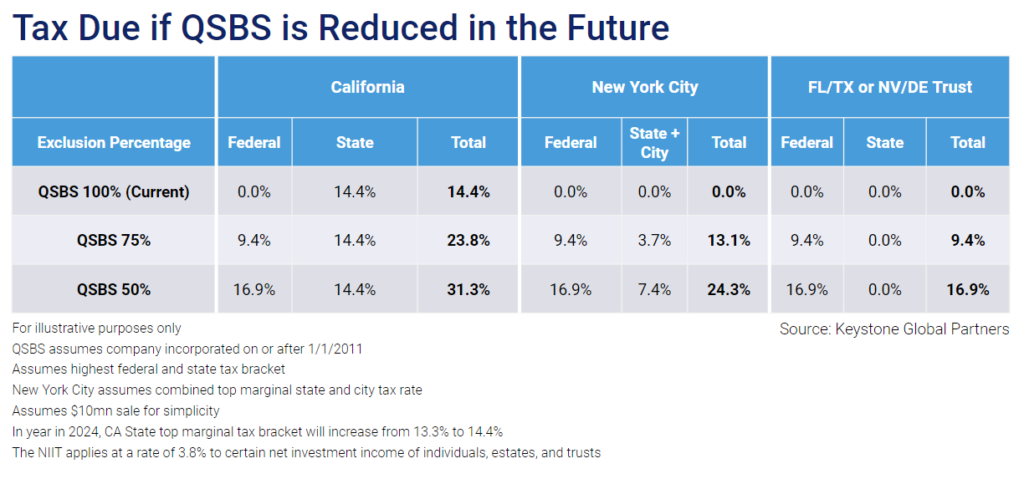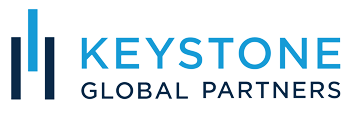This article was originally published on TechCrunch.com on November 18, 2022. Written by Peyton Carr.
When a founder sells their company, valuation gets a lot of attention. But too much emphasis on valuation often leads to too little consideration for what stockholders and stakeholders pay in taxes post-sale. Personal tax planning can ultimately impact the take-home proceeds for a founder as much as exit-level valuation changes can. And with the pullback in both public and private market valuations this year, and fewer exits occurring, optimizing on the personal planning front now can make a meaningful difference in the future.
After an exit, some founders may pay a 0% tax rate while others pay over 50% of their sale proceeds. Some founders can walk away with as much as two times the take-home as other founders at the same sale price—purely due to circumstances and tax planning.
How does this happen? Taxes owed will ultimately depend on the type of equity owned, how long it’s been held, where the shareholder lives, potential tax rate changes in the future, and tax planning strategies. If you’re at least thinking about taxes now, chances are you’re ahead of the game. But determining how much you’ll owe doesn’t come with a simple answer.
In this article, I’ll provide a simplified overview of how founders can think about taxes and an easy way to estimate what they will owe in tax upon selling their company. I’ll also touch on advanced tax planning and optimization strategies, state tax, and future tax risks. Of course, it goes without saying that this is not tax advice. Prior to making any tax decisions, you should consult with your CPA or tax advisor.
How Shareholders Are Taxed
Let’s assume you’re a founder and own equity or options in a typical venture-backed C-Corp. A number of factors will come into play to determine whether you will be taxed at short-term capital gains or ordinary income tax rates versus long-term capital gains or Qualified Small Business Stock (QSBS) rates. It’s essential to understand the differences and the areas for optimization.
Below is a chart summarizing the different types of taxation and when each applies. I further break this down to show the combined “all in” federal + state + city taxation, if applicable. Founders with $10mn+ exits on the horizon should explore some of the Advanced tax strategies I covered in one of my previous articles since there are opportunities to multiply or “stack” the $10mn QSBS exclusion and to minimize taxation further.

As you can see above, some of the more common levers that influence how much tax a founder owes after an exit will be QSBS, trust creation, the state in which you live, how long you’ve held your shares, and the decision of whether or not to exercise your options.
Charitable planning is not shown in the chart above but can produce excellent tax outcomes for those with large exits. Typically, when an exit involves an IPO or public stock, the founder can donate a portion of that stock to a foundation or donor-advised fund to get the fair market value deduction of the stock without realizing the gain.
QSBS and Risk to QSBS Tax Rates
When it comes to minimizing capital gains tax, QSBS can be a game changer for those that qualify. In case you’re not already familiar with QSBS, here is an overview, including the qualifications.
If you qualify for QSBS and meet the holding period requirements by the time you sell in the future, you could be in great shape. QSBS is the most significant personal tax savings lever in most transactions.
Currently, a taxpayer can exclude up to $10mn, or 10x basis, whichever is greater. There are some advanced tax planning opportunities to exclude more than $10mn, depending on your situation.
However, there’s a possibility that the QSBS exclusion could change, and founders should be familiar with the history of QSBS and what could happen in the future. QSBS has only been at the 100% exclusion rate since the end of 2010, which has worked out favorably for many tech founders. However, some current lawmakers are looking to cut the exclusion in half. The first version of the Build Back Better Bill included a reduction from 100% to 50%. The legislation was killed, but looking forward, there is a possibility this could happen.

So, what would it mean for you if the QSBS exclusion decreases to 75% or 50% in the future? To understand how this would impact a founder upon an exit, look at the graphic below, which shows estimates of the total tax due (federal + state + city) based on the state where you may live after an exit.

Common Questions Regarding Tax on Selling a Company
As you can see in the table, California founders, in particular, stand to face the most significantly pronounced outcomes. Additionally, California recently quietly increased the top marginal income tax rate from 13.3% to 14.4%, starting in 2024. California-domiciled founders and key shareholders throughout the state understandably should be thinking in advance about this.
We often hear questions such as:
- What is the difference in tax if I wait the full five years to get QSBS versus selling now?
- Should I move to another state before my transaction?
- Should I set up a trust before my transaction?
- How can I optimize for tax before my transaction?
The answer to all of the above is: it depends.
You can use the charts in this article to run through various hypothetical situations that might be similar to your own situation.
For example, on one end of the spectrum, a founder in New York City (NYC), Florida (FL), or Texas (TX) that waits to sell until meeting the QSBS qualifications and holding period requirements could see a big after-tax difference. Assuming 100% QSBS exclusion, a founder in NYC who waits would pay essentially 0% in tax. Without waiting, the NY founder would pay 38.6%, and the FL or TX founder would pay 23.8%. So, waiting to sell could be advantageous, considering all else equal.
On the other end of the spectrum, a founder might not see that material of a difference. For example, if the QSBS exclusion is cut in half from 100% to 50%, a California (CA) founder who waits for the five-year mark instead of immediately selling would pay 31.3% instead of 38.2%—probably not worth a multi-year wait since the tax benefit may not be material enough to influence the timing of the transaction.
However, state relocation may be worth consideration. If the same CA founder in the same scenario (QSBS at 50%) were to relocate permanently to FL and sell after they reached the five-year mark, they would pay 16.9%. That said, we don’t think upending one’s life to another state solely for tax purposes is the best qualitative decision. But, if there was already an intention to move to a state tax-friendly state like FL or TX, as an example, it might be worth accelerating the timeline on the move.
If a CA-based founder doesn’t plan to move to a state tax-friendly state, they do have other options, such as trust creation in some scenarios, although this needs to be carefully thought through and planned in advance. I cover some of those considerations here; however, depending on where the QSBS exclusion is in the future, they may ultimately yield a different set of answers over time.
The Bottom Line
As a founder, you’ll need to plan for your personal tax situation to optimize the opportunity set that is presented to you. The framework I’ve outlined in this article will help you think strategically about taxes, run through some hypothetical scenarios, both now and in the future, and have a more informed conversation with your tax advisor or CPA.
The information and opinions provided in this material are for general informational purposes only and should not be considered as tax, financial, investment, or legal advice. The information is not intended to replace professional advice from qualified professionals in your jurisdiction.
Tax laws and regulations are complex and subject to change, and their application can vary widely based on the specific facts and circumstances involved. Any tax information or advice in this article is not intended to be, and should not be, used as a substitute for specific tax advice from a qualified tax professional.
Investment advice in this article is based on the general principles of finance and investing and may not be suitable for all individuals or circumstances. Investments can go up or down in value, and there is always the potential of losing money when you invest. Before making any investment decisions, you should consult with a qualified financial professional who is familiar with your individual financial situation, objectives, and risk tolerance.
